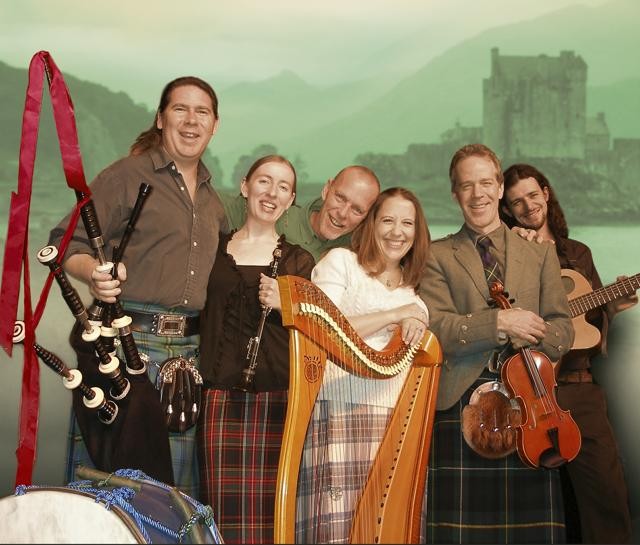“By the time Scots-Irish settlers came to this area, the Christmas music tradition had already been well-established,” says award-winning fiddler and Asheville resident Jamie Laval. So, while there is a signature music from Appalachia, “a lot of the traditional carols that we all know and love had existed for centuries,” says Laval.
A deep love and understanding of Celtic cultural and musical traditions, a foundation of classical training, and a fresh look at celebrating the holiday season: that's the recipe for Christmas in Scotland: Seasonal Music and Stories from Celtic Lands, at Asheville's Isis Theatre on Friday, Dec. 27. Laval hosts the event, which will feature music and storytelling focused on the season. But not, perhaps, the season you'd think.
“Those were village dance tunes,” he says of Christmas carols. “The church took a hold of them, slowed them down and added Christian-based lyrics to them. By the time the settlers came here, the tunes were thought to be regular Christian Christmas carols. But if you look way back, that changeover from being Pagan-based holiday music had already long since taken place.”
And it's those pre-Christian traditional village folk dance tunes that Laval and his compatriots (David Brown on guitar, Rosalind Buda on Scottish bagpipes and bombarde, and EJ Jones on Highland pipes, as well as a Celtic harpist, soprano singer and Scottish Highland dancer) will play at this special performance. “I've made my specialty in really, really ancient Scottish music,” Laval says. “And I try to give a fresh spin to it.” Laval is well-suited to such an ambitious goal: He began his formal musical training in British Columbia at the Victoria Conservatory of Music, where he studied classical violin.
But he quickly fell in with the region's folk traditions. “My first summer job was playing chamber music in the lobby of a grand old lodge,” Laval says. “Everyone who worked at the hotel had a tendency to spend off-days at the grange hall dances. So after being in music a very short time, I started doing square dances, barn dances.” Initially, those folk dance events were a mere sideline and hobby for the young fiddler. “But,” he continues, “over the years, as I pursued a classical career in symphony playing, I got better and better at the folk music.” He says that he eventually devised his own style, a “signature rendition of Scottish and Irish” traditions within the framework of the Celtic music format.
“Ten or 12 years into classical music,” Laval says, “I realized that my heart was really leaning more toward folk music than classical. I made a decision to turn a corner.” He went out in style, though: his final classical gig was Puccini's Madame Butterfly, performed with the Seattle Opera. “A grand send-off,” he says.
Celtic music is handed down through note-for-note re-creation of the tunes. Asked if he finds that relatively strict format limiting or liberating, Laval chooses the latter, and attributes it to a characteristic one might not think to associate with the style: groove. And, unlike classical, “the liberating part is that there's no requirement to be faithful to a score.” In folk music, Laval points out, “it's perfectly permissible to re-render the music in a different tempo, a different harmonic structure, with different emotion.”
Reflecting on the universal appeal of folk music, Laval suggests that humans are “hard-wired for rhythm.” Moreover, he says, “I understand the depths of emotion that come across through folk music.” That, he says, is due in part to the fact that “folk music is the product of not one composer, but a collective body of people as the music is passed from one generation to another. It gets imbued with the sentiments of each of its contributors. And so the music ends up being an expression of a people, of a whole culture.” In Celtic music, Laval hears the “yearning and longing and struggle and triumph that's built into that long tradition.”
And that culture — with its long-held pre-Christian traditions — will be the focus of the “Christmas in Scotland” show. “This is a chance to put together the kind of lineup I don't usually get to play with,” says Laval. He customarily performs solo or with a very small group. Bigger ensembles usually necessitate large venues and large stages, with the accompanying divide between performer and audience. Laval promises that “Christmas in Scotland” at the Isis will be “intimate, but yet I get to work with dancers. And that's always fun.”
— Bill Kopp is an Asheville-based music journalist whose features and reviews can be found at musoscribe.com and musoscribe.com.
what: Christmas in Scotland: Seasonal Music and Stories from Celtic Lands
where: Isis Restaurant and Music Hall
isisasheville.com
when: Friday, Dec. 27, at 8 p.m.
$24 advance/$28 doors/$12 students



Before you comment
The comments section is here to provide a platform for civil dialogue on the issues we face together as a local community. Xpress is committed to offering this platform for all voices, but when the tone of the discussion gets nasty or strays off topic, we believe many people choose not to participate. Xpress editors are determined to moderate comments to ensure a constructive interchange is maintained. All comments judged not to be in keeping with the spirit of civil discourse will be removed and repeat violators will be banned. See here for our terms of service. Thank you for being part of this effort to promote respectful discussion.